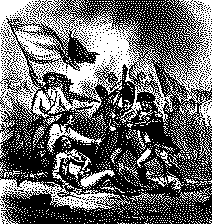Sounds on the Vanished Wind
The written record, whether in cuneiform, hieroglyph or paper, has long been the most enduring form of memory. From it, we first hear from Plato of the rumor of Atlantis; through it, Caesar tells us, in his own words, how he conquered Gaul. We can still read the Sermon on the Mount. But we cannot hear the words, nor the sound of the wind on that far hill in Galilee.
Yet it is possible to recapture something of those lost sounds in traditional music. Human memory being what it is, the record does not go back many thousands of years. Still we can hear what must have grated on Lord Cornwallis' ears as he surrendered his command to George Washington at Saratoga. Most historians are agreed that the ragged United States Army fifers played The World Turned Upside Down as the British Army marched into captivity. Like most American martial music of the period, it was derived from British sources, from which, they were after all, sprung. Click on the picture, if you want to listen.
If you followed the advance of the 3/7th Cavalry into Iraq, or have simply seen too many movies, you may wonder why Cavalry units use the salutation, "Garry Owen, Sir!". It derives from the association between the ballad of that name and George Armstrong Custer. Custer heard the tune one day, and decreed that henceforward, it would be played whenever the 7th Cavalry deployed. It was played on the day he and his command rode into history, and played since, with happier results.
Click on the heraldic shield of the 7th (now a part of the 1st Cavalry Division) to the hear the tune. It may have been played, at one time or other, as the 1st Cavalry made it's dash for Manila in 1945. And no, Garry Owen is not a person. It was a Gaelic Tavern called Garrai Owen, which makes it good enough for the Cavalry.
Yet if there were one tune, which represented, as it were, the Last Men of the West, it would be The Girl I Left Behind Me. It is old beyond reliable reckoning, already popular in Elizabethan Times. Shakespeare heard it. As near as can be determined, it was written by the Elves, or at least the Irish. It has been a staple of the armies of Britain, Australia and America for more than 300 years.
It must have been played by the Die Hards fighting Napoleon at Albuera; certainly the 20th Maine Regiment resisting the forces of slavery at Little Round Top had heard it. The Diggers bound for Lone Pine would have marched to it, when they boarded ship at Circular Quay. It's a sprightly tune, yet it carries an undertone of the grace, tragedy and sorrow of the kindred. Click on Eastman Johnson's painting, of the same title to play.





<< Home